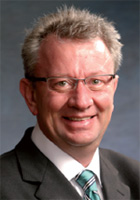As I visit hospitals these days, the open staff forums seem to be full of nurses who keep raising their concerns about increasing workload and nurses resigning. These front-line colleagues ask what the HA can do about the situation.
I share these concerns, as I see that in recent years our numbers of doctors and allied health staff have increased, but our nurse workforce has not grown, despite an increase in patients being treated.
We have a plan, but this will require some patience and the cooperation of front-line nurse managers and doctors. The plan has five parts.
First, we must train more nurses. When we did our workforce planning two years ago, we realised that the universities were not training enough nurses for our future needs, and to even meet our existing nursing workforce standards. We put the case for more nurses to be trained in the universities and there was some increase, but still not enough. So, we re-opened HA nursing schools as a temporary measure and re-introduced Enrolled Nurse (EN) training.
The number of nurse graduates each year will progressively increase from 600 two years ago to 1,500 in 2012.
Second, the promotion opportunities have increased in the HA. Last year 450 new nurse promotion positions were created. This now means that the number of senior nurses is much higher than it has ever been in the HA. The promotions provide more senior nurses on night shifts, recognise ward managers, and provide interesting new opportunities for nurse-led clinics. I hope that nurses will realise that by staying in the HA there are better promotion and professional opportunities.
The turnover of senior nurses has reduced from 4.21% to 2.69% after the programme was launched.
Third, while we wait for the new nurses to be trained, we are trying to do what we can to help with the nurse workload. In the last year, care-related support staff has increased by 600 (+7%). We continue to purchase electric beds to reduce back injuries and allow patients to be more independent. We now have over 8,000 electric beds.
Fourth, we have tried to improve employment pay and conditions. The starting salary has been increased and we now offer permanent employment to nurses after three years, provided performance meets our standards. We have made part-time work remuneration more attractive, but I would like to see supervisors offer this option to more nurse colleagues rather than have them leave the HA totally.
I will continue to look at other staff benefits to attract people to stay in the HA.
The final part of the plan is the most difficult. It is how we can show more respect and appreciation to nurses. When I ask nurses why they stay, the most common response is "I like the team I'm working with". Our new VMV emphasises "happy staff" and "teamwork", and everybody in the team has a responsibility to respect and support each other. Perhaps the most good can be done by the nurse supervisors and doctors °– a kind word and sensitivity to the heavy workload of front-line nurse colleagues will certainly help.
I appreciate the caring attitude and commitment of our nurse colleagues and will keep working to create a better working environment for nurses in the future. |


